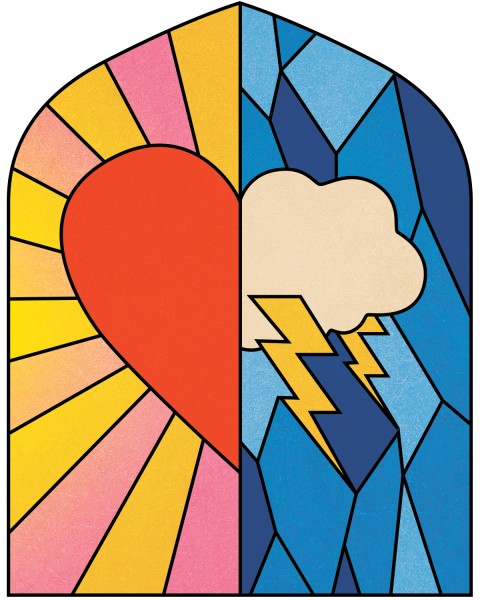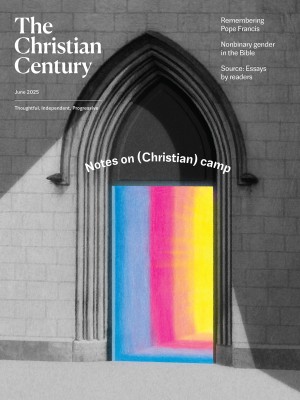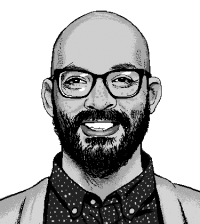Insecurity and the problem of evil
One of my more shameful memories comes from my time coaching youth soccer as a teenager.

Illustration by Katie Carey
What does it mean to have faith, to believe in a God who is present when it seems like power and greed inevitably win? In the face of these kinds of questions it often feels like we need to address questions of theodicy, that fancy theological word for explaining why or how evil exists, especially in a world supposedly ruled by an all-powerful God. We want to believe in a God who is powerful, but so often it feels like God isn’t present. And if we think of power as something that has to be wielded in order to be shown, I guess there is only one way to think about all the evil we see in the world. Either God is in control and lets it happen, or there is no God.
But are those the only two options?
One of the most dangerous things about insecurities is the way they are often overcome by controlling other people. I realize the idea of insecurity is a strange turn to take when thinking about the problem of evil. But I wonder if the evils of our world—whether they be individual acts toward one another or ourselves or the wider, more insidious social structures that we grow within and nurture—tend to be grounded in the insecurities we refuse to acknowledge.
Read our latest issue or browse back issues.
One of my more shameful memories comes from my high school years. I was a soccer player. It was the totality of my identity. I was good, but others were better—and I knew it. And devotion and insecurity are a dangerous cocktail.
Occasionally, I would help coach elementary school kids. I’d walk onto the field fully kitted out, ready for the biggest game of my life. They would be in awe of this big kid and his nice cleats. I would do a few fancy dribbles or juggle the ball six or seven times in a row, much to their amazement. It felt so good to be the fastest, the most skilled, the tallest. During scrimmages, the main coach would pass the ball to the kids on his team or create space for them to try. Meanwhile, I gleefully dribbled through every kid, employed every trick I knew, and yelled, “Gooooooooooaaaaaaaaaalllllllllllllll” after I scored my first, second, third, fourth, fifth.
One day the coach asked a former player of his to help out too. Let’s call him Jamal. I walked onto the field in my usual way, ready to soak up the kids’ awe, to let my prowess gleam in the midst of their incompetence. Jamal came out in everyday sneakers and shorts. As soon as he took his first kick you could tell he was good. You could see it in the way he carried his body, the rhythm of his run, the way the ball seemed to listen to him with his every touch.
Scrimmage started, and anxious to show how good I was, I took up my usual inclination toward dominance. I weaved through a dozen little legs, broke a few tender ankles. I finally reached Jamal. It didn’t seem like he moved at all. All I saw was a slight shift in his hips and then his foot in front of the ball I was about to strike. The next thing I knew, I was face down in the grass, and he had already sent the ball upfield, in one fluid motion, to a teammate waiting to score.
Again, maybe this is a weird way to talk about the problem of evil. But when Jamal walked on the field, the kids encountered a real soccer player. (It turned out he was home on spring break from playing for his Division I team.) He was good, and he did not have to dominate little kids to prove it. His ability made room; it flickered in the smallest movements. I was so willing to show every trick and flash of speed, to see every challenge as an opportunity to prove I had power. Jamal could let the kids play and be.
I wonder if the reason it feels like evil’s various incarnations always win is that they sprout from that very first bend of human consciousness, that gift of freedom that makes love possible. And I think wherever love is possible, fear is as well. In a world where connection and love can be achieved, the possibility of being without is never far off.
And isn’t this what so much oppression is fundamentally grounded in? We want to be sure of our place in the world. When confronted by our limitations, wrestling with our insecurities—whether our death or our need or another’s joy—we will tend toward domination, toward coordinating whatever is available to us to make ourselves feel powerful.
I suppose this is why Jesus’ life and ministry were so threatening. For all its land and wealth and military strength, the Roman Empire was so hollow that it had to fight and scrap and lord over its weakest members. In the midst of this, Jesus’ power flowed from peace, from a centeredness that made room. Faced with the possibility of fear, Jesus chose love—and in his love he unmasked any clownish infatuation with power.
I have always remembered Jamal and been embarrassed about the person I tried to be before meeting him. But recognizing my insecurity has also helped me to recognize those who violently grasp for power and those whose power flows from love. I have no doubt evil will kill, will devastate. Maybe this is why it feels like evil always wins, because it can never keep from reminding us of its presence, of the vestiges of power it tries to claim. But I am also sure that evil fights so violently because it knows it cannot win—and that in the midst of its violent flailing, there are endless ways to reveal its cracks.







